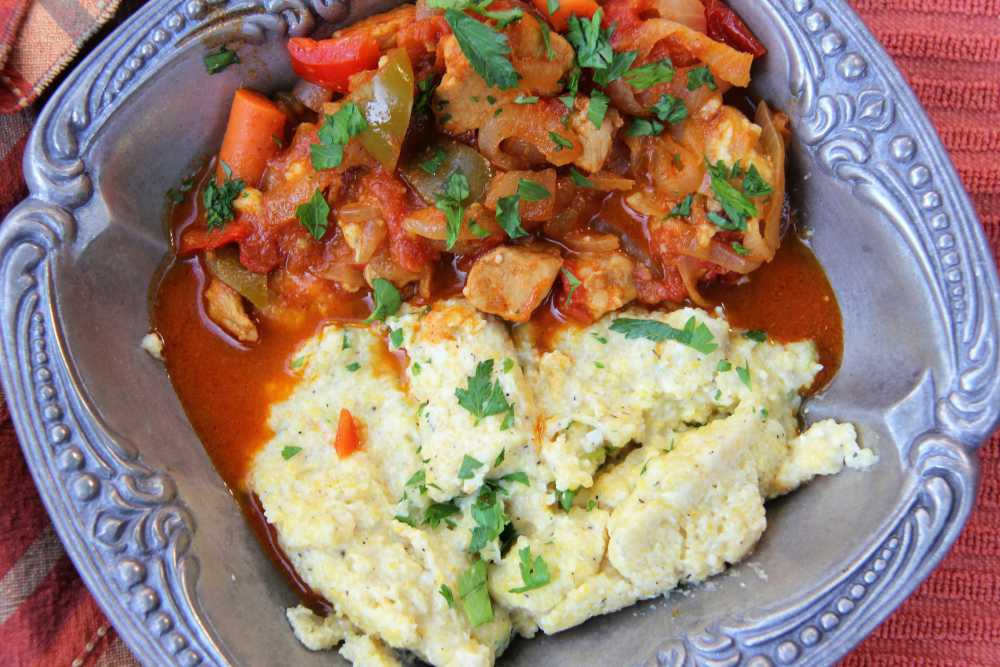 Pork goulash is a traditional Romanian food that is easy to make. Move over Hungary, great Romanian goulash is another classic goulash to watch out for!
Pork goulash is a traditional Romanian food that is easy to make. Move over Hungary, great Romanian goulash is another classic goulash to watch out for!
Classic goulash is rightfully popular all over the world. A not too spicy stew, toned down with some sour cream, is one of the world’s great tastes. An authentic goulash recipe may be made with beef, veal, lamb or pork. The seasoning for goulash and the meat selected, account for some of the local differences between a goulash made in Hungary and other Eastern European countries like Romania, Poland and many, other nearby countries.
Classic goulash might be the national dish of Hungary, but it is also a traditional Romanian food, paying homage to its shepherding past.
And what to serve with goulash? There are so many great options. Mashed potato, pasta and rice just to name a few. But if you want to experience traditional Romanian food, pair your pork goulash with polenta. And, polenta has the added attraction of being gluten-free. While the defacto, national dish of Romania might be cabbage rolls, pork goulash with polenta runs a close second.
Where Did Goulash Originate?
Where did goulash come from? There is no secret to this one. There is a reason a traditional Hungarian goulash recipe, is the national dish of Hungary. But, it is typically made with beef these days.
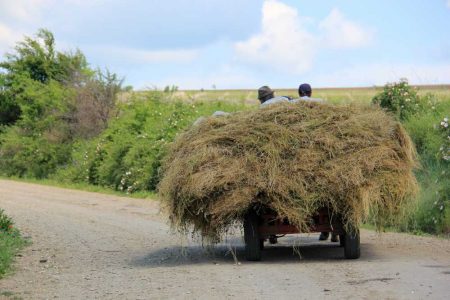 What’s goulash? A traditional goulash recipe is a thick stew first made by Hungarian shepherds when away from home, incorporating meat, vegetables and spices. The main spice for goulash is paprika with other spices playing a supporting role.
What’s goulash? A traditional goulash recipe is a thick stew first made by Hungarian shepherds when away from home, incorporating meat, vegetables and spices. The main spice for goulash is paprika with other spices playing a supporting role.
An authentic goulash recipe has a substantial amount of agricultural history behind it. The origin of goulash dates to a time when herdsmen or shepherds would be away for months at a time, usually all-male groups of 4 to 6 shepherds looking after the herd. The meat would be cooked, spiced and dried before leaving home. The simple addition of water makes for a thick stew that could be quickly put together at the end of the day. You can read more about the origin of goulash here.
PLANNING AN UPCOMING
DINNER PARTY?
Get a FREE copy of the ITALIAN
DINNER PARTY MENU, complete with recipes!
A traditional goulash recipe always includes paprika. Seasoning for goulash requires paying some attention to what variety of paprika you are using. A quick trip to a good grocery store, confirms there are many varieties of paprika to choose from. Do you want a spicy goulash or are you after a classic goulash with a milder taste?
If you are looking to replicate a classic goulash recipe I would go for “Hungarian paprika”, “smoky paprika” or “sweet paprika”. They will all deliver slightly different results. The best all round choice is “Hungarian paprika”, if you love a smoky taste go for “smoky paprika”. “Sweet paprika” is the mildest choice. You can read more about paprika here.
Once you know what paprika you are going to use, it is time to make our paprika pork recipe, pork goulash.
Traditional Romanian Food: Pork Goulash
 In rural, Romania, you can still observe shepherds, hard at work, minding their flocks of sheep. Tradition still runs very strongly in Romania and this flows through in the food. On numerous occasions, we observed traditional Romanian food being prepared on open fires with big pots of steaming Romanian dishes.
In rural, Romania, you can still observe shepherds, hard at work, minding their flocks of sheep. Tradition still runs very strongly in Romania and this flows through in the food. On numerous occasions, we observed traditional Romanian food being prepared on open fires with big pots of steaming Romanian dishes.
This authentic goulash recipe is a popular food in Romania. Pork goulash is easy to make and is all “set and forget”. All the work is up front making it an ideal dinner party food. There are no hard to source items to buy. Most people already have these ingredients in their kitchen.
And what to serve with goulash? In Romania, they serve it with Romanian polenta. Yes, polenta. Gluten-free, filling and a perfect base for soaking up all those lovely Romanian goulash juices. In fact, polenta is a popular Romanian food, maybe even more popular than in Italy. Using polenta as the answer to what to serve with goulash is a major point of difference from Hungarian goulash.
Have some fun with this dish. It’s a great paprika pork recipe that is sure to appeal to the whole family And remember, experiment with the spicing and ingredients. Use this recipe as a base for what you have in your kitchen!
More Stews, Casseroles and Comfort Food
Fancy trying some other great stews and casseroles from around the world? You might try these ones:
Here is a French, Coq au Vin with a twist, try this chicken and red wine classic in the slow cooker.
Here is another easy, slow cooker recipe using beef and Pinot Noir. Red Wine and Herb casserole is a good one for busy people.
Two great stews you can try from Greece are Beef Stifado and Drunken Pork (also using red wine). I see a trend here!
And finally, maybe my favorite stew of all time. Sultan’s Delight from Turkey is made with lamb and paired with smoky eggplant. It delivers an incredibly rich and satisfying meal. Give it a try, you won’t regret it!
| Servings | Prep Time | Cook Time |
| 6people | 30minutes | 2hours |
| Servings | Prep Time |
| 6people | 30minutes |
| Cook Time |
| 2hours |
- 4 tbsp olive oil
- 4 tbsp butter
- 2 cloves garlic finely chopped
- 2 medium onions, brown sliced thinly
- 2 lb stewing pork diced into bite-size or small pieces
- 4 tbsp paprika, hungarian
- 1 bell peppers (capsicums), red sliced
- 1 carrots chopped
- 4 cups sauerkraut drained
- 3 bay leaves torn
- 1 tbsp tomato paste
- 1 lb tomatoes, canned, chopped
- 4 tbsp sour cream
- 4 tbsp parsley chopped
|
Ingredients
Servings: people
Units:
|
- In a heavy-based pan or dish with a lid over a moderate heat, add the olive oil and butter. Add the garlic and onions. Saute until softened, about 3 minutes. Then add the pork. Saute until the pork is browned on all sides.
- Add the paprika, bell pepper, carrot and drained but not rinsed sauerkraut, bay leaves, tomato paste (puree) and tomatoes. Stir well to combine. When at a simmer, turn the heat to low and allow to simmer, covered for 1 hour. Remove the lid, and allow to simmer for a further hour.
- Remove from the heat and stir in the sour cream. Serve over the top of creamy mashed potatoes or polenta or pasta. Garnish with chopped parsley.
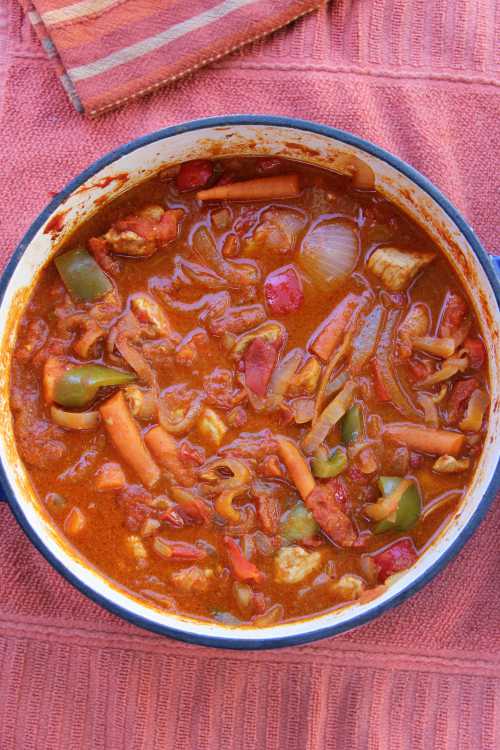
We visited Bucharest as guests of #ExperienceBucharest, a five-day event featuring media and influencers from all over the world.

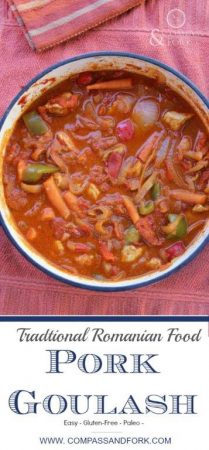
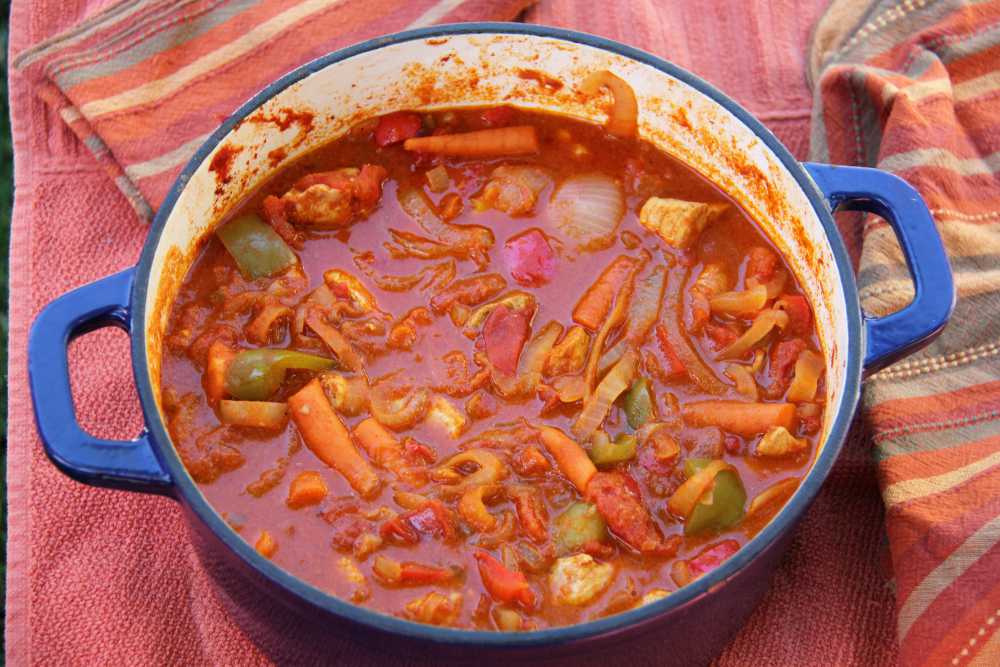

Predestogo
This sounds and looks really yummy.
Wonder if this would be good using lamb, since it was made by Shepards originally? Think I will try it both ways.
Corey
In my family whom are Romanian decent make it with lamb quite often.
Katie
I plan on making this soon; do you think it would be as good made in the slow cooker?
Compass & Fork
Definitely- just reduce the amount of liquid for te slow cooker.
Meredith
I remember a goulash recipe from my childhood that sounds so much like this romanian version. It is the sauerkraut that I remember most, it added such depth to the stew. I can’t wait to try your recipe, thank you!
ChihYu
What a lovely stew for colder months. It’s hearty and flavorful. Thanks for sharing this wonderful recipe!
Emily
This looks like a very hearty, comforting meal. I bet it’s especially delicious during the colder months.
Megan Stevens
All that sauerkraut makes my mouth water. Plus I love pork and goulash. What a fantastic experience and recipe. Thanks for sharing!
STACEY CRAWFORD
Such a rich and hearty dish! I didn’t know polenta is very popular in Romania. Interesting!
Hope
This looks very hearty and tasty, I have never tried a pork goulash before so have pinned this to try later! Thanks for sharing the history of goulash, I love reading about where different dishes originate from 🙂
Joni Gomes
Growing up in Germany my mom often made Goulash! Warms my heart to make and eat this!!
Raia Todd
Mmm… That looks perfect for a chilly day!
Catherine Baez Sholl
Great comfort food recipe! I love the focus on its origin too.
Renee D Kohley
Love learning all the history! Thank you! This looks delicious – my girls would definitely eat this!
Lynn | The Road to Honey
Such an interesting history on goulash & I find it fascinating that the shepherds prepped the meat before they left home. This is such a lovely goulash and, while it is a stew, I think it would taste great spooned over top some quinoa.
Editor
Thanks for your comment Lynn. There are so many great accompaniments for this dish. I like your idea on quinoa. Then there are other options like the polenta featured here but also mashed potato, pasta and rice is also a good option.
Rebecca | Let's Eat Cake
Yum! Love the history about the goulash as well – I didn’t know it used to be a shepherd’s dish but that makes a lot of sense!
Editor
The history of individual dishes certainly is an interesting food topic. Goulash is so well known and eaten all around the world, so good to have some historical perspective.